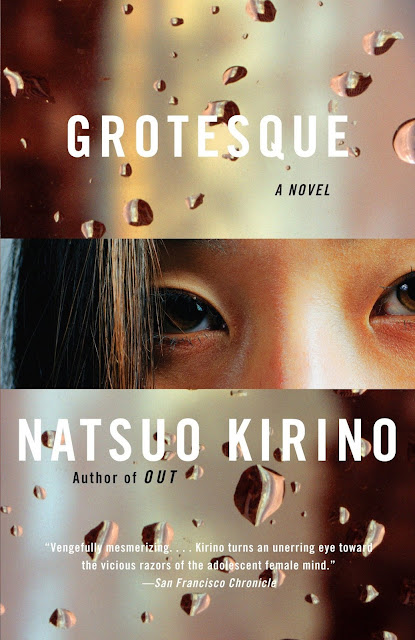Literature by Matt S.
“You didn’t know, did you, dear? Johnson and I broke up because of Yuriko.” I suddenly remembered the expression on Jonson’s face as he sat in front of the fireplace in his moutain cabin on that night so long ago with Yuriko leaning against his lap, playing sweet with him. She was just a primary school student then.”
Grotesque’s willingness to dip into the extreme has echoes of Marquis de Sade’s writings, and that doesn’t seem to be coincidental. In his writing, de Sade was so extreme, violent, and sadistic because, as a revolutionary, it was his way of highlighting the shocking hypocrisy, corruption, and dark underbelly of the establishments of his time (his favourite target was the church). It was his expression of anger. Kirino has her own targets, and Grotesque is a deeply feminist novel.
Throughout the book, the common thread is that the only way women can find a degree of freedom and security is to allow themselves to be victimised by men. “Men live by rules they’ve made for themselves,” Kirino writes. “And among those rules is the one specifying that women are merely commodities for men to possess. A daughter belongs to her father, a wife to her husband. A woman’s own desires present obstacles for men and are best ignored. Besides, desire is always for the man.”
For women, trying to take control of themselves, and write their own rules, is not just something that results in society punishing the woman (i.e. prostitutes find themselves being killed), but also something so fundamentally confusing to men that the “punishment” becomes a curiosity, rather than something that raises anger or a desire for justice. “If a woman who is beautiful but has no other redeeming value turns to tricks until she’s ancient, no one gives it a second thought. But Kazue’s turn to prostitution left everyone racking their brains to figure out why. A career woman by day, a prostitute by night. Men everywhere were beside themselves trying to work that one out.”
Grotesque comes across as a bitingly angry book, with a strongly nihilistic outlook on the future. It’s most certainly sex-positive – it is certainly not critical of the sex workers, or judgmental on why a person might turn to the profession, but for a culture as patriarchal as Japanese society is, Grotesque is also a damning indictment of the way that the society treats girls and women.
“A biology professor certainly ought to be able to recognise the signs of fermentation and decay. Isn’t he the one who taught us all about these processes in organisms? In order to induce the process of decay, water is necessary. I think that, in the case of women, men are the water.”
Grotesque is a masterpiece of modern feminist crime fiction. It’ll make you feel uncomfortable and deflated, and it’s a very long book with very little relief. It’s easy to read, but hard to settle down for long reading sessions. Originally published in 2003, this book is only becoming more relevant today, in the era of MeToo, as people start to realise that the stifling, crushing claustrophobia of books such as this are closer to the experience that far too many women go through than society wants to admit.
– Matt S.
Editor-in-Chief
Find me on Twitter: @digitallydownld
Please help keep DDNet running: Running an online publication isn’t cheap, and it’s highly time consuming. Please help me keep the site running and providing interviews, reviews, and features like this by supporting me on Patreon. Even $1/ month would be a hugely appreciated vote of confidence in the kind of work we’re doing. Please click here to be taken to my Patreon, and thank you for reading and your support!








